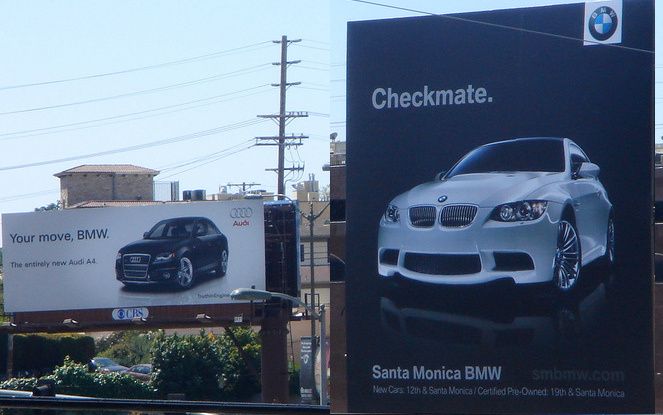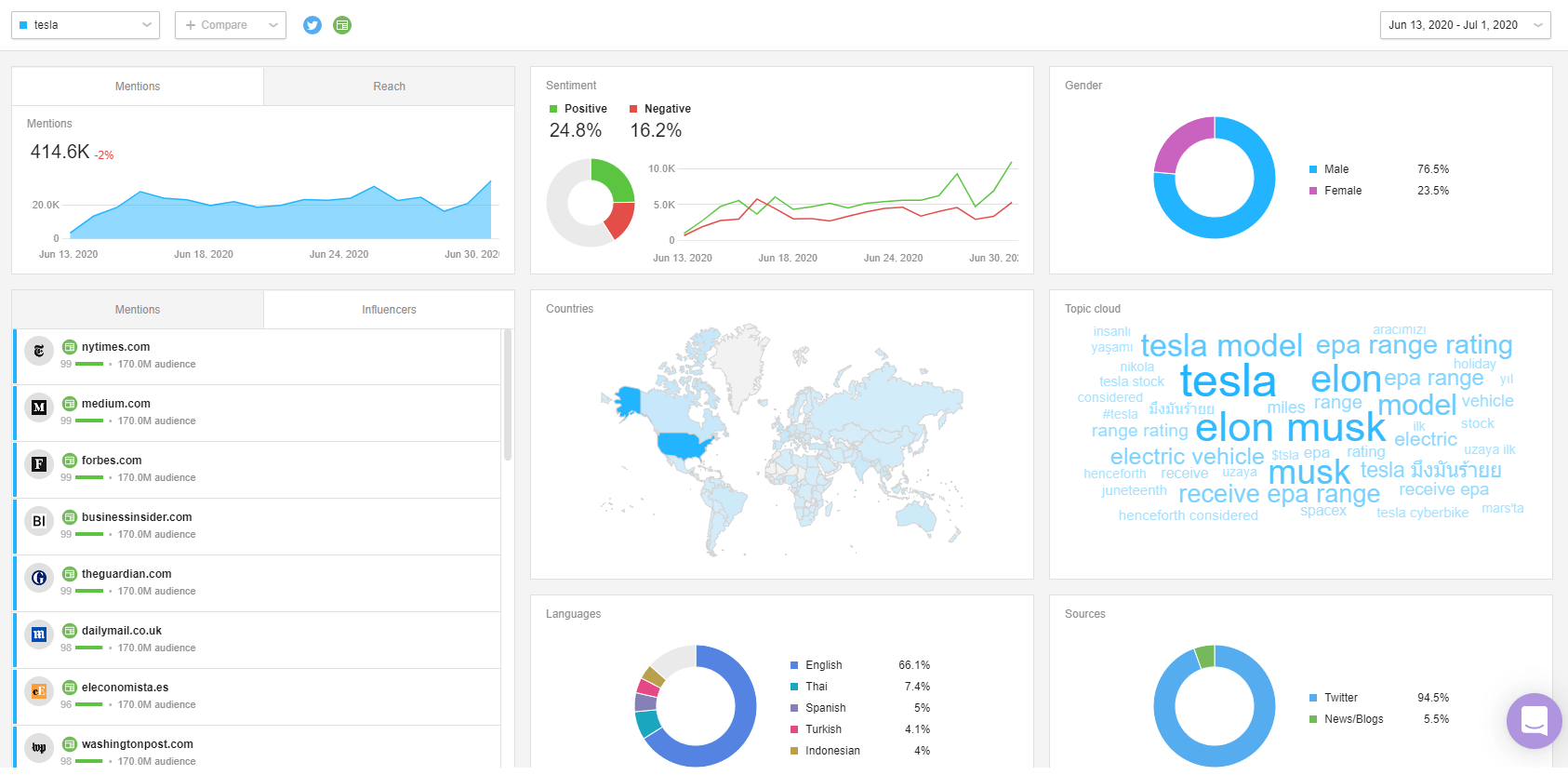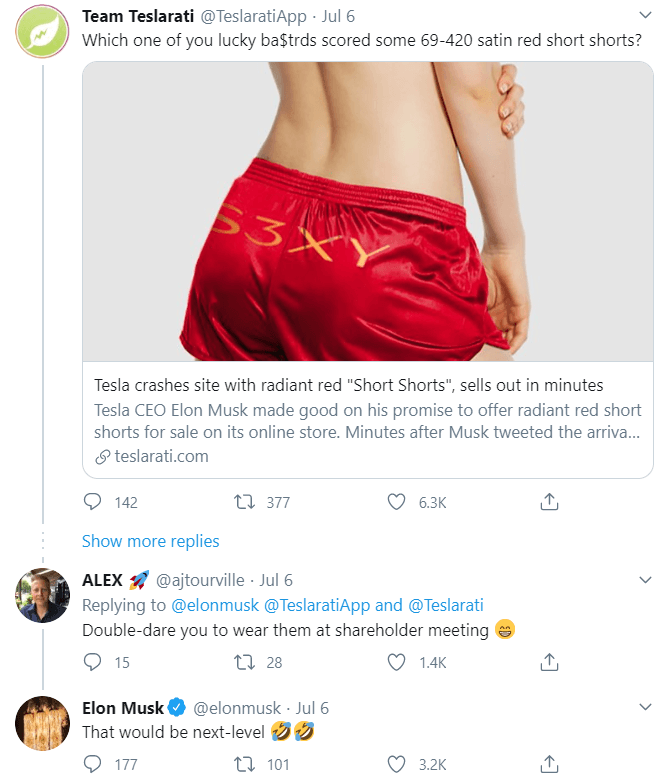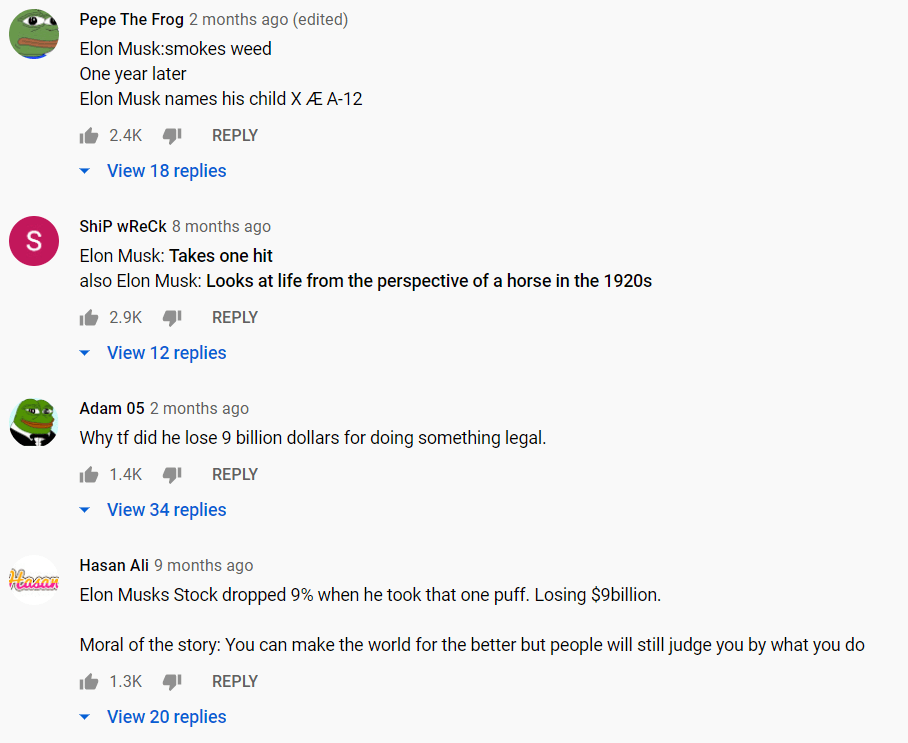Tesla on social media: the chaotic force of Elon Musk

Tesla is the first brand that comes to mind when the conversation turns to electric cars. In fact, for those not really interested in cars, it is the only brand that comes to mind. Of course, there are others, but let’s not talk about them to keep the point valid. Let’s talk about marketing instead.
What do you recall when you think about marketing around cars? Probably, expensive ads. A beautiful vehicle driving smoothly through forests and seas. This is the life, you think. You want that.

Sometimes, car commercials get creative. They are funny and clever, and they often win awards at Cannes.

In the best of times, car commercials also get into awesome brand battles.

But not Tesla. Tesla has a barely noticeable marketing budget. You'll never catch it on TV or on a billboard, it won't be there to pay whoever makes incredible Super Bowl ads. Tesla's crazy level of brand recognition comes organically from social media. Here's its present condition:

As you can see, right now the number of overall mentions as well as positive mentions is growing together with Tesla's stock prices.
By signing up I agree to the Terms of Use and Privacy Policy
How is Tesla this popular without any advertising?
Tesla's values align with popular modern values.
Musk's personality and his active use of social media ensure Tesla’s extreme level of recognition, a constant presence in the traditional media, and Tesla's symbolic status. Cars have always been symbolic: they show the owner's social-economic status, values, and hobbies. If you drive a Tesla, you signal something more than your level of income and the need for speed (as is usually the case with other expensive cars). You show your vision of the future, love for innovation, care for the environment… Whose values are those?
Correct, those are the values of millennials and gen Z.
It's hard to market cars to these generations. As we know, millennials avoid buying cars, as any long-term substantial purchases seem not worth it for the generation that is poorer than their parents but has car-sharing and Uber. And gen Z is not fully in the car market yet.
But if anyone is able to overcome this, it’s Tesla with its values and Elon Musk as the only real, authentic influencer CEO.
Elon Musk is the first and only CEO influencer.
While most brands have to partner with influencers, for Tesla, it’s unnecessary ― Elon Musk himself is one of the most influential social media users. On his main platform, Twitter, Elon has 36.6 million followers. This is more than Tesla’s (or SpaceX’s) following, and it’s more than that of any other CEO you can think of.
Elon Musk is the definition of a charismatic leader who has built a truly impressive personal brand. I'd say only political leaders could compare, but in fact, it still might be them who have to take lessons from Elon Musk.
You can clearly see that his presence on Twitter and YouTube is not going according to any “social media strategy”. He shares his thoughts, often very random ones, and posts things that are funny, controversial, and sometimes obviously damaging to his reputation and the reputation of Tesla.

He posts tweets about his personal life next to tweets about his political views next to Tesla or SpaceX promotional tweets. And he talks to others ― a lot. He replies to regular Twitter users with random questions and he replies to Tesla owners. He also retweets people’s opinions about the car.

Can you think of any other CEO doing that? Mark Zuckerberg, Tim Cook, Jeff Bezos? Founders or CEOs of Google, Twitter, Buzzfeed? No matter how huge and popular and “fun” the brand is, CEOs usually act carefully on social media or don’t act at all. And I’m not even talking about any of the CEOs of the companies similar to Tesla. I bet you wouldn’t recall Audi's or VW’s CEOs and wouldn’t even think of following them on Twitter.
Musk doesn’t just stand out in terms of his social media presence ― he’s unique.
Is this always good for his company? Let's find out.
The good of Musk's online presence:
1. Communicates with social media users.
Talking to random Twitter users and replying to Tesla owners makes Elon Musk and his companies available, approachable, and trustworthy. And just so entertaining.

2. Shares things from his personal life; posts memes and what seems like shower thoughts.
Musk’s relationship with the Canadian musician Grimes was all the media talked about for a while. The birth of their common child was featured as much in the media as the following rocket launch. At the same time, every funny, puzzling, geeky, and plain weird tweet Elon makes (which he does a lot) keeps up his personal brand.

3. Shares good as well as bad.
Elon Musk doesn’t just promote Tesla on social media. He also talks about the production, failures, and problems they face. He apologizes, explains, and discusses the situation with all of his over 36,6 million followers.

This behavior is sometimes shared by startups, but never by the CEOs of the same level as Elon Musk. This, again, creates a community around Tesla. The community of people who feel like they’ve grown with the company, got through the challenges, and finally won.
4. Strives to solve real problems.
Amid personal ambitions, Elon Musk seems to genuinely care about the problems the world faces. During the 2018 Camp Fire in California, Musk offered free charging for Tesla cars. Tesla helped people breathe: the cars were equipped with hospital-grade HEPA filters.
After Hurricane Maria in Puerto Rico, Musk helped rebuild the power infrastructure. And when Australia experienced a power crisis, Elon installed a giant battery in 63 days. Of course, he did it on a bet, once again showing that his care for the people and the environment is highly intertwined with his ego. But what does it matter when the people got their power back?

There are plenty of other examples when Elon Musk and Tesla jumped on the opportunity to solve an urgent problem. This has often been done with the lack of social grace and often enough Musk’s ideas didn’t work. Such cases brought as much bad publicity as they brought good publicity, but the billionaire continues to be the first to raise his hand whenever there’s a case he thinks he can solve.
By signing up I agree to the Terms of Use and Privacy Policy
The bad of Musk's online presence:
1. Makes quick accusations.
Social media is the place where once you say something, it can’t be unsaid. It’s screenshotted, saved, and used against you. So when Musk called a Thai rescuer a “pedo” on Twitter, the world didn’t take it well. The common conclusion on social media was that while Elon might be smart, he’s definitely a terrible person.

2. Forgets his tweets have real power.
We get it ― most of us post things on Twitter and nothing happens. Most of us can genuinely admit we are paid too much or too little and nothing will change. For Musk, however, this is obviously different. So when he tweeted that he’s considering taking Tesla private at $420 per share, this wasn’t taken as a weed joke that it most likely was. It was taken seriously and caused a lawsuit with the SEC, a $40 million settlement, and Musk stepping down as Tesla's board chair with restrictions on his communications.
The lesson should’ve been learned right there and then (in 2018), but not so long ago Musk tweeted that Tesla stock price is too high, and surely enough, it fell immediately.

People's reaction followed, too.

3. Smoked weed on a podcast.
Musk smoking weed on the Joe Rogan podcast had some bad consequences: SpaceX delayed its test launches for the Commercial Crew program and had to be reviewed by NASA. Tesla stock prices plummeted. However, social media users generally supported Elon Musk rather than condemned him for this, and the video got more than 35 million views.

The unknown factor in Musk's online presence:
Political beliefs.
While you may or may not agree with Musk’s often controversial opinions (recent views included opening the factory despite the epidemic, supporting Republicans, and supporting Kanye West in his idea to fight for the presidency), you can’t ignore that they attract plenty of attention.
But what kind of attention? Mostly, they cause a backlash and from no other than Tesla’s target audience: liberal Americans who care about innovation and the environment.

However, again, with political views attracting so much attention with everyone from music stars to the president mentioning Tesla, it’s really impossible to tell whether the company wins or loses because of that.
The conclusion?
Let's take a deep breath and remind ourselves that we're not here to decide whether Elon Musk is a good person or a bad person. Nor are we here to assess how clever he really is. What we can conclude with a fair share of certainty is that even taken into account his bad chaotic actions, his lawsuits, and his unstable reputation, Tesla is winning. Its brand recognition and the number of positive mentions is going up, its stock price is also going up (and is too high, imo ;) ). Tesla is now the most valuable auto company on the planet and is worth more than Toyota, Disney, and Coke.
How long will that stay for? We don't know. But everything Musk did on social media, including the tweets that caused him billions, played a part in Tesla's success. With his every action and every pronounced thought he keeps the world watching and the buyers on the edge of their sits. He creates a universe that's as exciting to watch as a Netflix show, and that people desperately want to be a part of. And they can be - by purchasing Tesla.













